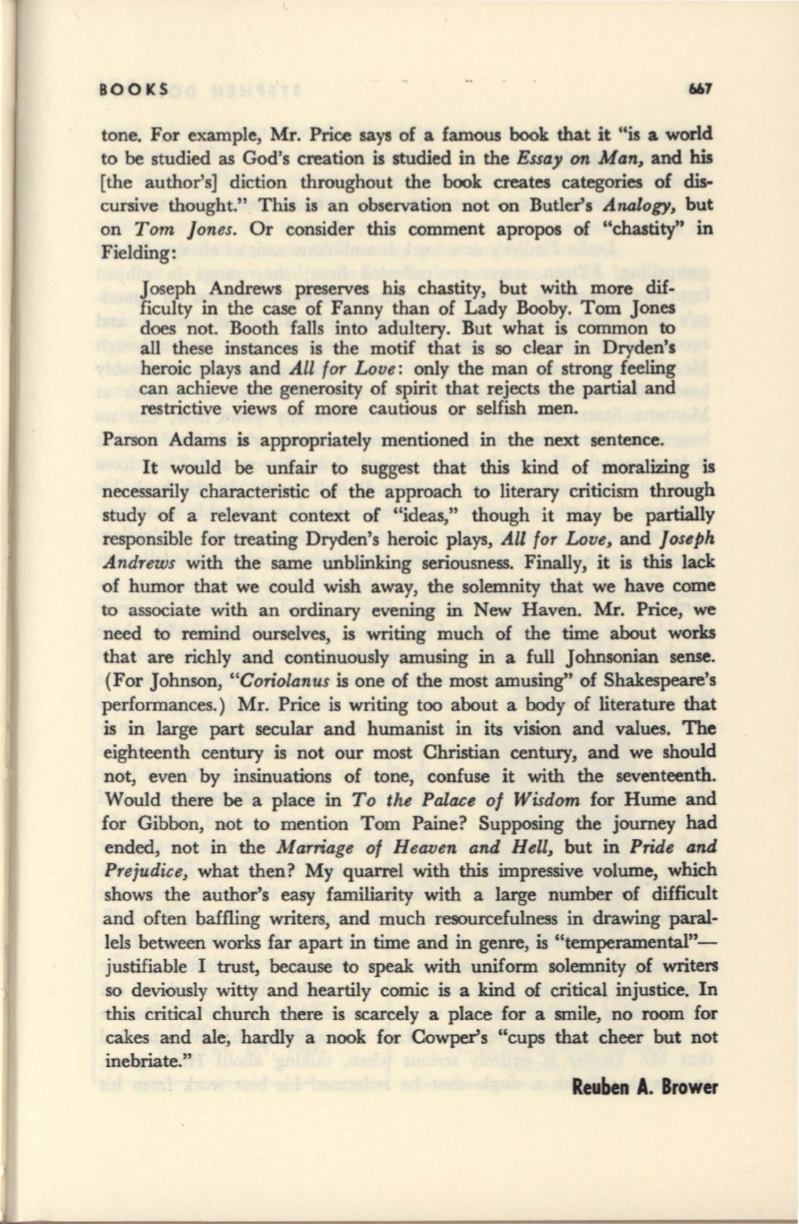

BOOKS
641
tone. For example, Mr. Price says of a famous book that it "is a world
to be studied as God's creation
is
studied in the
Essay on Man,
and
his
[the author's] diction throughout the book creates categories of
dis–
cursive thought." This is an observation not on Butler's
Analogy,
but
on
Tom Jones.
Or consider
this
comment apropos of "chastity" in
Fielding:
Joseph Andrews preserves
his
chastity, but with more dif–
ficulty in the case of Fanny than of Lady Booby. Tom Jones
does not. Booth falls into adultery. But what is common
to
all these instances is the motif that
is
so clear in Dryden's
heroic plays and
All for Love:
only the man of strong feeling
can achieve the generosity of spirit that rejects the partial and
restrictive views of more cautious or selfish men.
Parson Adams
is
appropriately mentioned in the next sentence.
It would be unfair to suggest that this kind of moralizing is
necessarily characteristic of the approach to literary criticism through
study of a relevant context of "ideas," though it may be partially
responsible for treating Dryden's heroic plays,
All for Love,
and
Joseph
Andrews
with the same unblinking seriousness. Finally, it
is
this
lack
of humor that we could wish away, the solemnity that we have come
to
associate with an ordinary evening in New Haven. Mr. Price,
we
need to remind ourselves, is writing much of the time about works
that are richly and continuously amusing in a full Johnsonian sense.
(For Johnson,
"Coriolanus
is
one of the most amusing" of Shakespeare's
performances.) Mr. Price is writing too about a body of literature that
is in large part secular and humanist in its vision and values. The
eighteenth century is not our most Christian century, and we should
not, even by insinuations of tone, confuse it with the seventeenth.
Would there be a place in
To the Palace of Wisdom
for Hume and
for Gibbon, not to mention Tom Paine? Supposing the journey had
ended, not in the
Marriage of Heaven and Hell,
but in
Pride and
Prejudice,
what then? My quarrel with this impressive volume, which
shows the author's easy familiarity with a large number of difficult
and often baffling writers, and much resourcefulness in drawing paral–
lels between works far apart in time and in genre, is "temperamental"–
justifiable I trust, because to speak with uniform solemnity .of writers
so deviously witty and heartily comic is a kind of critical injustice. In
this
critical church there is scarcely a place for a smile, no room for
cakes and ale, hardly a nook for Cowper's "cups that cheer but not
inebriate."
Reuben A. Brower









